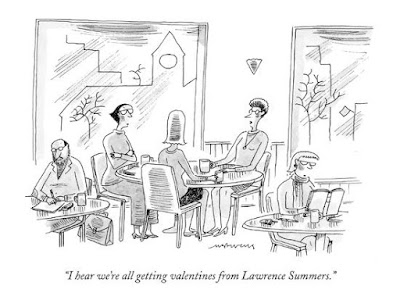Marc Lavoie has written this post on the current inflation debates, which received some attention. We had a conversation (I don't say debate because we mostly agreed, and the video is here, last September). I also recommend Julia Braga and Franklin Serrano's paper on Marc's chapter on inflation, which is relevant for the current debates. The debate rages, within heterodoxy, as if a lot of the ideas are new, but quite frankly they are a recap of discussions of the past, particularly for those that dealt with the extensive debates about inflation and hyperinflation in Latin America in the 1980s and 1990s.That demand-pull inflation was not the cause of inflation, I think is accepted among heterodox authors, and increasingly so within the mainstream or at least the media, that mostly covers
Topics:
Matias Vernengo considers the following as important: Arestis and Sawyer, Braga, Greedflation, Lavoie, Meltzer, Oligopolistic Inflation, Reich, Serrano, Summers
This could be interesting, too:
Matias Vernengo writes Serrano, Summa and Marins on Inflation, and Monetary Policy
Matias Vernengo writes What is heterodox economics?
Bill Haskell writes The Economics of Killing Medicaid . . .
Matias Vernengo writes The Economist and the American Economy
Marc Lavoie has written this post on the current inflation debates, which received some attention. We had a conversation (I don't say debate because we mostly agreed, and the video is here, last September). I also recommend Julia Braga and Franklin Serrano's paper on Marc's chapter on inflation, which is relevant for the current debates. The debate rages, within heterodoxy, as if a lot of the ideas are new, but quite frankly they are a recap of discussions of the past, particularly for those that dealt with the extensive debates about inflation and hyperinflation in Latin America in the 1980s and 1990s.
That demand-pull inflation was not the cause of inflation, I think is accepted among heterodox authors, and increasingly so within the mainstream or at least the media, that mostly covers the mainstream. After an initial idyll with Larry Summers and the notion that excessively large fiscal packages during the pandemic had caused inflation, now his view that a prolonged period of relatively high (or at least higher) unemployment was necessary for stabilization has fallen out of favor. Disinflation has taken place with relatively low levels of unemployment (which, it's worth remembering measure very poorly the conditions in the labor market in our neoliberal era, and where there is more slack than noted due to significant numbers of discouraged workers). The coverage has changed from thinking Summers was right to dismissing his views. He was wrong both times.
I'm more concerned with the dominant view among progressives that inflation was caused by higher profit margins, associated to the excessive power of corporations. Something that has been called greedflation, by many commentators (see Robert Reich's recent column here), and that back when, in a distant past in another galaxy, we called oligopolistic inflation. So this is mostly a debate between neoliberal and progressive Dems (Republicans have been less relevant; for their view go to this conference/book including John B. Taylor, John Cochrane and others at the Hoover Institution; not very different than Summers, who was at the conference, at least conceptually, even if more hawkish, if that is possible).*
In particular, I think the main remaining issue is the question of the role of mark ups, or profit margins in the inflationary process. As I noted before, the idea of oligopolistic inflation is in some sense a reaction to the notion that wage resistance and wage-price spirals would imply that workers are responsible for inflation (in this reading as much as demand-pull inflation would require unemployment for stabilization, conflict inflation would imply the need for wage stagnation). Some heterodox economists have even suggested that wage-price spirals are sort of a myth.
Note that when workers manage to increase wages, then price making firms will try to recompose their margins and increase prices. And if workers are not satisfied, as prices go up again and real wages fall, then you get a spiral. Hence, the wage-price spiral is a reflection of distributive conflict, and that workers and capitalists are not satisfied with their relative shares. In that sense, inflation is neither wage-led nor profit-led, like accumulation can be. It is the result of incompatible income claims by both classes.
There is a simple model in this old paper for the Handbook edited by Phil Arestis and Malcolm Sawyer, in which I discussed the three causes of inflation for heterodox authors, supply shocks, inertia and conflict.
* The inflation paranoia is somewhat surprising, with Taylor saying that: "The answer to the key question, 'Are We Entering a New Era of High Inflation?' is clearly 'yes,' unless monetary policy makers change policy." Note that this is not new. The late Allan Meltzer warned against the dangers of excessive monetary expansion after the 2008-9 crisis, saying back then: "the enormous increase in bank reserves caused by the Fed’s purchases of bonds and mortgages will surely bring on severe inflation if allowed to remain." So, you would have to really believe in the lags in monetary policy (more than a decade) for his prediction to make any sense.

